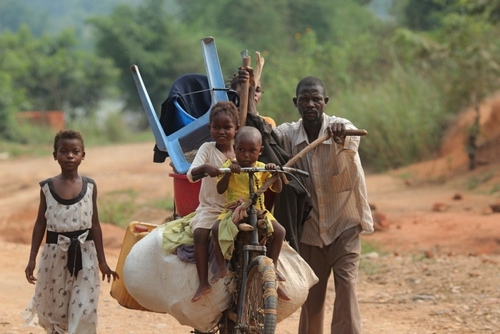DRC: More than 1 million people uprooted from their homes by lingering violence in Kasai
Lying on a well-worn mattress strapped onto a bicycle overloaded with household items, and pushed hastily by his older siblings, the little boy was fast asleep. He was exhausted from a punishing trek that families are forced to take to escape persistent tensions in several towns and villages in the Democratic Republic of the Congo’s (DRC’s) conflict-hit Kasai region.

Gédéon Mboyi with his family. Most of the families fleeing to Kananga endure a painful journey. They pack their belongings, take their children and run in search of safety.
More than 1 million people have been uprooted from their homes since a violent anti-Government revolt erupted last year in Kasai. The displacement, destruction and looting of homes, health centres and schools have worsened adversity in one of the country’s poorest regions: some 1 million people are now severely food insecure and about 400,000 children are at risk of malnutrition.
Lingering tensions continue to force families to flee. Between June and August, 6,800 people fled into Kasai Central Province from Kasai Province, according to Cooperative Réveil, a Congolese NGO based in Kananga, the capital of Kasai Central. Some of the displaced people say they are fleeing ethnically motivated tensions and attacks in Kasai Province. Since the conflict broke out, more than 630,000 people have been displaced in Kasai Central alone.
An overlooked crisis
Deprived and devastated by the conflict, displaced civilians endure grinding hardship. Many of those who have arrived in Kananga have settled with relatives and friends or returned to their family homes, which they left several years ago in search of opportunities in Kasai. There are no formal camps or sites hosting the displaced people around Kananga, thus host families are overstretched.
“Most of the affected people have received no external help, while local communities have generously taken people in and offered the modest help they can,” said Mark Goldring, Oxfam’s Chief Executive, following a recent visit to DRC.
Modeste Bukasa, the Coordinator of Cooperative Réveil, explained that there are inadequate levels of food, medical and psychosocial assistance for the displaced, suggesting that sites need to be established in urban centres along the main roads to assist people fleeing violence.
“Many people, especially children, have died on the Tshikapa to Kananga road due to lack of food and medical assistance,” he said.
“When we buy food, we ask the seller to taste it first”
Most fleeing families arrive pushing two-wheelers overloaded with belongings and young children. Others who have the means pay to flee aboard trucks and other vehicles. But the trek is bruising and perilous, and it has claimed newborn children, the young, the frail and the ailing. Dozens of people fleeing to the capital, Kinshasa, died recently in a road accident, local media reported.
Sixty-year-old Madeleine Tshitoka recently arrived with her son in a village outside Kananga. Three years ago, she left for Tshikapa, the capital of Kasai Province, to live with her sister and find work. The region is one of the country’s mineral-rich provinces and has drawn people from other parts of the country in search of opportunities.
“We fled fearing reprisal attacks because the conflict started here [Kasai Central],” said Madeleine. “We managed to take only a few items. We left the rest of our belongings.”
Madeleine’s 29-year-old son, Ngalumulume Kabengele, explained that the Pende and Tshokwe people in Kasai Province have turned against the Luba and Luala people, who are from outside the province. Locals are targeting their neighbours from other regions: some food vendors poison palm oil, caterpillars (a local treat) and other food to harm buyers from other communities. “When we buy food, we ask the seller to taste it first,” said Ngalumulume.
For 10 days, Gédéon Mboyi trekked with his wife and four children (the eldest is seven) from a village near Tshikapa to Kananga, their belongings and younger children loaded onto an old bicycle. An attack on their village had forced them to seek safety in the bush for two weeks.
“We left the bush to go check things at home,” said Gédéon. “Everything had been looted. People are living in fear, not knowing when the next attack will happen.”
In April, the humanitarian community appealed for US$64.5 million. Five months on, only 37 per cent of the funds has been received.
“Sometimes we beg for food, other times we go hungry”
Life was already a struggle in what is among DRC’s poorest provinces, but it has become even harder for civilians affected by the conflict. Many lost their belongings in attacks. Some residents are slowly returning to their homes, or what remains of them. Others are afraid of fully embarking on their daily livelihood activities, as they fear losing everything again in fresh attacks.
Seventeen-year-old Pauline Kabeya lost both her parents during an attack on their village outside Kananga, where people are slowly retuning. “We have nothing,” she explained. “I sell firewood to earn some money. But life is tough. Sometimes we beg for food from our neighbours. Other times we go hungry.”
Source: UN Office for the Coordination of Humanitarian Affairs
- 273 reads
Human Rights
Fostering a More Humane World: The 28th Eurasian Economic Summi

Conscience, Hope, and Action: Keys to Global Peace and Sustainability

Ringing FOWPAL’s Peace Bell for the World:Nobel Peace Prize Laureates’ Visions and Actions

Protecting the World’s Cultural Diversity for a Sustainable Future

Puppet Show I International Friendship Day 2020

